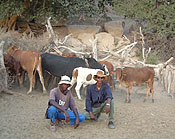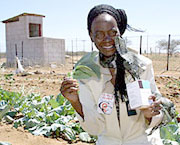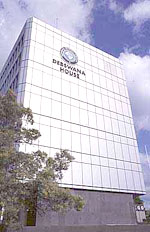|
|
 |
1 oktober 2004
Elections in Botswana
On 30th October this year Botswana will go to the polls. They will vote for a new parliament, the National Assembly. The new parliament will later choose a new president, in all probability the incumbent President Festus Mogae. Surprises are not expected. The Botswana Democratic Party (BDP) governs the country since independence in 1966 and will win the elections again.
Botswana is a country the size of France. It has a population of 1.7 million, of which more then 35 per cent is HIV-positive. Botswana borders Zimbabwe and suffers from its neighbours political and economic crisis. At this moment it is estimated that between 100.000 and 200.000 Zimbabweans have fled to Botswana.
Botswana is seen as a stable and peaceful democracy on continent full of problems. There is freedom of the press, human rights are upheld and there regular elections. The government is presented as a example for good governance. However, critics maintain, the country under continuous BDP rule since 1966 has many characteristics of a paternalistic one-party state.
Election results 1999:
| voter turn-out 42% | candidates | | seats | | pct seats | | pct votes |
|
|
Botswana Democratic Party (BDP) | 40 | 33 | 82,5% | 54,34%
|
|
Botswana National Front (BNF) | 38 | 6 | 15% | 24,67%
|
|
Botswana Congress Party (BCP) | 38 | 1 | 2,5% | 11,31%
|
details: www.eisa.org.za/WEP/botswana6a.htm
The number of seats will be expanded to 57 |
Democracy?
De BDP has a loyal following in the rural areas, the opposition has support only in the towns. | | Beef from from Botswana is also sold in European supermarkets |
Because of the close relationship between the state, the BDP, traditional chiefs and an elite of large cattle-owners, some observers have expressed doubt on how democratic the country really is. They question whether the State is responsive enough to the needs of outside groups, such as women, the unemployed and ethnic minorities.
Jenny Clover points out in “Botswana: Future Prospects and the Need for Broad-based Development" (Institute for Security Studies, 2003) that despite the impressive economic growth, the country has fallen on the Human Development Index over the period 1990-2001, a phenomenon that occurred only in two other countries in the world, the Russian Federation and Moldova.
Striking is also the low number of people that voted. The political opposition parties are weak and divided, civil society organisations not politicised. The BDP is aware of the risks of estranging itself from the electorate. The current president Festus Mogae has been grooming the young Lt-Gen Ian Khama as his successor in 1999. Ian Khama is the son of the founder of independent Botswana, enjoys a popular following, and is ambitious. Not everybody, within and outside the BDP, likes his confrontational and populist style.
And what about his strong links with the military, the Botswana Defence Force? "[...] accountability of the military continues to be elusive and shrouded by a cloak of secrecy. (Mpho G. Molomo, "Civil-Military Relations in Botswana's Developmental State", 2001). Already, with no enemies or security threats and to the surprise of many, Botswana is spending a staggering 8 per cent of its total expenditure on the military.
Aids
The country has more problems. HIV/AIDS has hit Botswana hard. The country is situated on the truckers road from South Africa to the North. | | Women with free HIV-AIDS medicine |
Unfortunately, the traffic also bring sexually transmitted diseases. This has led to a staggering HIV-infection rate of more then 35 per cent of the population.
Botswana has, next to Sierra Leone and Malawi, the highest mortality rate in the world. Life expectancy has dropped from 68 (1995) to 38.1 years (2001). The potential consequences of the pandemic are disastrous: not nly in demographic, but in social and economic respect as well.
As the first country in Africa, the government has embarked on a extensive AIDS-programme, initiated and co-ordinated by president Mogae himself. It includes, amongst other things, the offering of free Anti-Retroviral Drugs Therapy to anyone infected with HIV. Much of the programme is funded by the Government of the United States, the pharmaceutical giant Merck, and the Bill and Melinda Gates Foundation.
Economy
Another source of concern is the economic dependence on diamonds. Diamonds were found in 1967 and are exploited by Debswana (jointly owned by the South African De Beers, and the State). In 2001/2, diamond mining accounted for one-third of the GDP. | | 'The partnership between De Beers and Botswana has been likened to a marriage. I sometimes wonder whether a better analogy might not be that of siamese twins.' - F. Mogae |
Debswana has brought Botswana relative prosperity. The government has spent the revenues prudently on health care and education.
The diamond industry does not generate much employment, only 5 per cent of the Botswana labour force. Over a period of ten years, the number of people working in traditional agriculture has dropped by 74 per cent, and jobs that were created were only the result of growth in government employment. The diamond industry does not generate much employment, only 5 per cent of the Botswana labour force. Botswana has a growing problem of unemployment and poverty.
The Government development strategy, “Vision 2016” specifically targets the much-needed economic diversification and strengthening of “citizen economic empowerment”. The Economist Intelligence Unit (EIU, London), however, thinks it is too ambitious: “[it] will only be partly successful owing to capacity constrains, a lack of skilled labour and overoptimistic goals.” (Botswana Country Profile, 2004).
Internationale position
Botswana is cherishes its international image as a peaceful and democratic country in Africa, as an important economic and political asset. The Government maintains good relations with Western countries such as the United Kingdom and the United States.
But there is criticism, especially from Western campaign organisations on the alleged treatment of the San, called Basarwa in Botswana.
In the arid central and western parts of the country, small groups of the ethnic minority of San (Bushmen), the original people inhabiting southern Africa, are living. The San are often idealised in the West as one of the oldest people in the world still living in harmony with nature. But in reality the Basarwa, as in the rest of southern Africa, are discriminated and live marginalised lives in destitute circumstances.
The Government has relocated the Basarwa communities from the Central Kalahari Game Reserve to make way for diamond mining. This provoked strong reactions with ethnic minority rights groups, such as the London based Survival International: “a crime against humanity” and even “genocide”.
The Government was extremely concerned about this link between its diamond mining and the issue of “blood diamonds”. It reacted strongly against this “foreign” intervention. The local NGO Ditshwanelo, which had campaigned for Basarwa rights, felt it necessary to distance itself from Survival International. Up to this moment, legal battles are being fought on behalf of the Basarwa against the government.
The whole issue has been brought in a broader perspective by Kenneth Good in "Bushmen and diamonds: (un)civil society in Botswana" (Uppsala: Nordic Africa Institute, 2003). He thinks it is a telling example of the authoritarian character of the BDP State, and of the weakness and passiveness of civil society.
external links:
| |
|
|

|
 |  |  |  |
|

